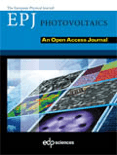
EPJ Photovoltaics
Scope & Guideline
Advancing solar innovation for a sustainable future.
Introduction
Aims and Scopes
- Photovoltaic Materials and Technologies:
Research on various photovoltaic materials, including silicon, perovskite, thin films, and organic solar cells, exploring their efficiencies, stability, and innovative fabrication methods. - System Performance and Optimization:
Studies aimed at optimizing the performance of photovoltaic systems, including modeling, forecasting, and real-time monitoring of solar energy generation under different environmental conditions. - Sustainability and Lifecycle Assessment:
Investigations into the environmental impacts of photovoltaic technologies, including lifecycle assessments, recycling strategies, and the integration of circular economy principles in solar energy deployment. - Advanced Characterization Techniques:
Utilization of advanced imaging, diagnostic, and characterization methods to assess the performance and reliability of photovoltaic modules and components. - Innovative Applications and Integration:
Exploration of novel applications of photovoltaic technology, such as building-integrated photovoltaics (BIPV), floating solar installations, and integration with other renewable energy sources.
Trending and Emerging
- Perovskite Solar Cells:
There is an increasing focus on perovskite solar cells, with studies investigating their fabrication, efficiency improvements, and stability. This trend is crucial as perovskites have the potential to revolutionize the solar energy landscape due to their high efficiency and lower production costs. - Machine Learning and AI Applications:
The application of machine learning and artificial intelligence to optimize photovoltaic system performance, including power forecasting and defect detection, is gaining momentum, showcasing the intersection of technology and renewable energy. - Bifacial and Floating Photovoltaics:
Research into bifacial solar panels and floating photovoltaic systems is on the rise, driven by their advantages in efficiency and land use, addressing the growing need for sustainable energy solutions in various environments. - Circular Economy in Photovoltaics:
Emerging studies prioritize circular economy strategies for photovoltaic deployment, focusing on recycling, material recovery, and sustainability, which are increasingly recognized as essential for the future of solar energy. - Advanced Performance Monitoring and Diagnostics:
The development of advanced monitoring techniques and diagnostic tools for evaluating photovoltaic performance under real-world conditions is trending, emphasizing the importance of reliability and efficiency in solar energy systems.
Declining or Waning
- Conventional Silicon Cell Technologies:
While silicon remains a dominant material, the frequency of publications specifically focused on traditional silicon solar cell technologies has decreased, possibly due to the emergence of more innovative materials like perovskites. - Basic Theoretical Studies:
The focus on purely theoretical approaches without practical application or experimental validation seems to be declining, as researchers increasingly seek to publish results that have direct implications for real-world applications. - Low-Efficiency Systems:
Research on low-efficiency photovoltaic systems or technologies that do not demonstrate significant advancements in efficiency or cost-effectiveness is becoming less prominent, as the community shifts toward higher-performance solutions.
Similar Journals

ELECTRICAL ENGINEERING
Exploring Breakthroughs in Electrical and Electronic EngineeringELECTRICAL ENGINEERING is a distinguished journal published by Springer that addresses the multifaceted challenges and advancements in the field of electrical and electronic engineering. With an impact factor that reflects its significance in the academic community, this journal offers vital insights into emerging technologies and groundbreaking research findings. Operating without open access, it provides a platform for rigorous peer-reviewed articles that span from applied mathematics to engineering disciplines. The journal has established a strong reputation, ranking in the Q2 category for Electrical and Electronic Engineering and Q3 for Applied Mathematics as of 2023, which showcases its commitment to high-quality research. The journal is indexed in Scopus, placing it within the 53rd to 71st percentiles in its respective categories. Researchers, professionals, and students alike will find ELECTRICAL ENGINEERING an invaluable resource for staying abreast of innovations and developments that shape the future of the electrical engineering landscape.
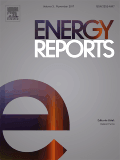
Energy Reports
Exploring New Horizons in Energy Research and TechnologyEnergy Reports, published by Elsevier, is a prestigious open access journal that serves as a vital resource in the field of energy research. Since its inception in 2015, this journal has swiftly ascended to become a key player in disseminating knowledge across various energy-related disciplines, evident from its impressive Q2 ranking in the miscellaneous category of Energy for 2023 and its notable position in the 78th percentile among over 70 journals in the general energy category, ranked 16th out of 73 on Scopus. Based in the United Kingdom, Energy Reports not only fosters innovative research but also promotes accessibility by providing open access to its articles, thereby ensuring that findings reach a global audience of researchers, professionals, and students. With a commitment to advancing sustainable energy solutions and technologies, Energy Reports plays a crucial role in shaping future energy policies and practices, making it an essential platform for scholarly communication in the ever-evolving landscape of energy research.

Solar RRL
Exploring the forefront of solar research and applications.Solar RRL, published by WILEY-V C H VERLAG GMBH in Germany, is a premier journal dedicated to advancing the field of solar energy research and technologies. With an impressive Q1 ranking across key disciplines—including Atomic and Molecular Physics, Electrical and Electronic Engineering, and Energy Engineering—this journal stands out as an authoritative source of high-impact research. Since its inception in 2017, Solar RRL has provided a platform for the dissemination of innovative ideas and findings, making vital contributions to the understanding of solar energy conversion, efficiency improvements, and sustainable technology. Researchers, professionals, and students seeking to stay at the forefront of solar energy advancements will find invaluable insights and rigorous studies in its pages. Although currently not an open-access journal, Solar RRL offers a subscription model that gives readers access to cutting-edge research that shapes the future of energy technology.
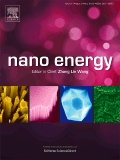
Nano Energy
Transforming Energy Landscapes with Cutting-Edge ResearchNano Energy is a premier journal published by Elsevier, focused on the dynamic intersection of nano-technology and energy solutions. Since its inception in 2012, this high-impact journal has made significant strides in advancing research across multiple disciplines, showcasing groundbreaking studies in Electrical and Electronic Engineering, Materials Science, and Renewable Energy. With an impressive Impact Factor that places it in the Q1 category of these fields—including a distinguished rank of #6 in Electrical Engineering and #9 in Renewable Energy on Scopus—the journal serves as a vital resource for academics and practitioners alike. Nano Energy aims to disseminate innovative research and developments that contribute to the sustainable energy landscape, thereby addressing pressing global energy challenges. Researchers and professionals seeking to stay at the forefront of nanotechnology applications in energy generation and efficiency will find this journal an indispensable platform for sharing knowledge and driving impact.

Solar Energy
Empowering knowledge in the realm of solar technologies.Solar Energy is a premier academic journal published by PERGAMON-ELSEVIER SCIENCE LTD, focusing on the advancements and research in the field of solar energy technology, sustainability, and related sciences. With an ISSN of 0038-092X and E-ISSN 1471-1257, this influential journal has been at the forefront of renewable energy research since its inception in 1957, with a commitment to fostering scientific communication up to the year 2024. Recognized globally, it holds an impressive impact factor, ranking in the Q1 category in both Materials Science and Renewable Energy, Sustainability and the Environment, positioning it among the top journals in its field—ranked #50/463 in General Materials Science and #34/270 in Renewable Energy. The journal serves as a vital platform for researchers, professionals, and students, providing access to groundbreaking studies, innovative methodologies, and comprehensive reviews that advance the understanding and application of solar energy technologies. While the journal is not open access, its rigorous peer-review process ensures the publication of high-quality, impactful articles that are invaluable to the academic community striving to address global energy challenges.

Ingenius-Revista de Ciencia y Tecnologia
Connecting scholars and industry for transformative solutions.Ingenius-Revista de Ciencia y Tecnología is a premier academic journal published by the UNIV POLITECNICA SALESIANA ECUADOR, dedicated to the dissemination of high-quality research across various engineering and technological fields. Established in 2011 as an Open Access platform, this journal has fostered knowledge sharing and collaboration among scholars and industry professionals. With a scope that encompasses diverse disciplines including Aerospace, Automotive, Biomedical, Civil, and Computational Engineering, Ingenius serves as a vital resource for researchers aiming to contribute to the advancement of technology and engineering solutions. Although currently placed in the Q4 category across multiple engineering disciplines based on the 2023 rankings, the journal is steadfast in its mission to elevate the quality of published work and enhance its visibility in global research databases. Given its commitment to open access and scholarly dissemination, Ingenius plays a significant role in promoting innovative ideas and fostering educational growth within the engineering community.
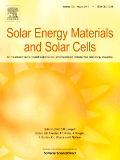
SOLAR ENERGY MATERIALS AND SOLAR CELLS
Exploring Breakthroughs in Solar Cell ScienceSOLAR ENERGY MATERIALS AND SOLAR CELLS is a distinguished academic journal published by Elsevier, based in the Netherlands, focusing on innovative research in the fields of materials science and renewable energy. With a substantial history dating back to 1970, the journal has evolved into a premier platform for disseminating advanced studies related to solar energy technologies, including the development and optimization of solar cells and materials. Recognized for its high impact, the journal maintains a Q1 ranking across multiple relevant categories such as Electronic, Optical and Magnetic Materials, Renewable Energy, Sustainability and the Environment, and Surfaces, Coatings, and Films. It ranks impressively within the top tiers of Scopus, showcasing its influence and relevance in the scientific community. Although it does not offer open access, the journal remains a crucial resource for researchers, professionals, and students aiming to contribute to the advancement of sustainable energy technologies and materials innovation.
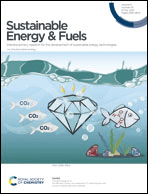
Sustainable Energy & Fuels
Exploring Innovative Pathways to Renewable EnergySustainable Energy & Fuels is a leading journal published by the Royal Society of Chemistry, dedicated to advancing knowledge in the fields of energy engineering, fuel technology, and renewable energy solutions. With its ISSN of 2398-4902 and notable Q1 status in both Energy Engineering and Power Technology as well as Fuel Technology, this journal ranks impressively in the Scopus database, ensuring a strong platform for disseminating impactful research. The journal spans a comprehensive scope aimed at addressing the global challenges of sustainable energy, including innovative methodologies and technologies that promote environmental sustainability. Although it operates under a traditional access model, the journal is committed to providing high-quality content that engages researchers, professionals, and students alike. With significant contributions expected through 2024, Sustainable Energy & Fuels stands at the forefront of facilitating scholarly communication, inspiring advancements in energy technologies that align with sustainability goals.

Advances in Energy Research
Advancing Knowledge for a Greener Energy Future.Advances in Energy Research is a prominent journal dedicated to the exploration and advancement of energy technologies and sustainable practices. Published by TECHNO-PRESS, this journal serves as a vital platform for researchers, professionals, and students in the energy field, featuring innovative studies and reviews that contribute to the body of knowledge surrounding energy efficiency, renewable resources, and the integration of new technologies. The journal holds a significant position in energy research and aims to facilitate the dissemination of groundbreaking findings and ideas that are pivotal for the transition toward a more sustainable energy future. Located in South Korea, with an ISSN of 2287-6316, it embraces an open access philosophy that ensures widespread availability of its content, further enhancing its impact in the academic community.

Advanced Energy and Sustainability Research
Advancing Sustainable Solutions for a Greener TomorrowAdvanced Energy and Sustainability Research is a leading open-access journal published by WILEY since 2020, dedicated to advancing knowledge and understanding in the realms of energy and sustainability. With an impressive impact factor and a commitment to high-quality, peer-reviewed research, this journal serves an international audience of researchers, professionals, and students passionate about addressing critical environmental challenges. The journal encompasses a wide array of topics within environmental science and energy fields, securing notable rankings in Scopus with top percentiles across several categories, including Ecology, Energy Engineering and Power Technology, and Waste Management. Given its open-access model, Advanced Energy and Sustainability Research facilitates the dissemination of cutting-edge research, enhancing accessibility and fostering collaboration within the scientific community. This journal not only plays a pivotal role in shaping public policy and industry practices but also aims to inspire innovative solutions for sustainable development in an increasingly complex world.